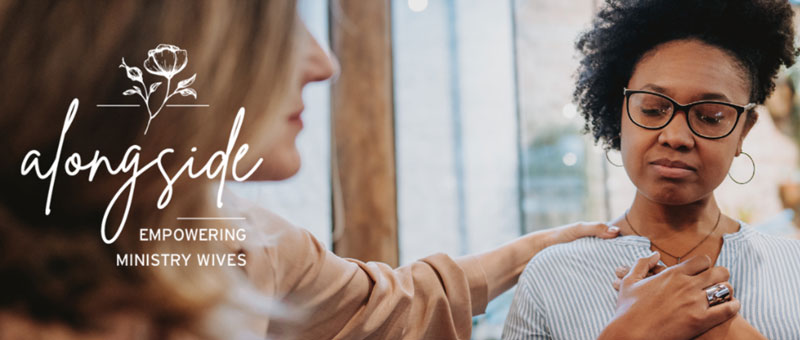It was the end of a hard week where the light brown, woven, oval, laundry basket on the floor of my closet told the story. Three flung funeral dresses with hints of black, dark green and navy were peeking out from the pile. Wave upon wave of grief and sorrow pounded again and again in this difficult week for our church. Like me, as a pastor’s wife, you often find yourself on the front lines of grief.
At the funeral and after the funeral, reaching out to a grieving person can be intimidating. What if I say the wrong thing? When should I call? What will help? These questions can intimidate well-meaning people into silence, which can add to the isolation a grieving person may already be feeling. This can be hard enough for the average person, but as a pastor’s wife, we often find ourselves carrying these questions on top of expectations that we already know how to bring some kind of balm to hurting hearts. I did a deep dive into these questions in the most unexpected, God-breathed journey of my life.
 After the last few crunched brown cardboard boxes were unloaded from the big blue moving van into my new house in Texas where my husband had gotten a call to be a lead pastor, I began the process of trying to get involved in my new community. An invitation from an acquaintance to volunteer at a local hospice sparked both curiosity and intimidation. Hospice was such a juxtaposition in my mind…a mix of warm kindness yet deep sorrow. I had never entered this world before, and I knew my empathetic heart would likely be pushed to its limits.
After the last few crunched brown cardboard boxes were unloaded from the big blue moving van into my new house in Texas where my husband had gotten a call to be a lead pastor, I began the process of trying to get involved in my new community. An invitation from an acquaintance to volunteer at a local hospice sparked both curiosity and intimidation. Hospice was such a juxtaposition in my mind…a mix of warm kindness yet deep sorrow. I had never entered this world before, and I knew my empathetic heart would likely be pushed to its limits.
God immediately drew my heart toward the bereavement side of hospice, and the training fascinated me. Training became the key that unlocked a tall steel door of intimidation, opening a way for me to more confidently reach out to grieving people.
In a whirlwind of heart-breaking situations, I felt the soft pillow of belonging, the gentle whisper that God created me for this and found myself staring at an application for grad school to learn even more. I learned that after a hospice death loss, Medicare provides 12 months of grief support with support groups, phone calls and letters. I learned that this was not enough support for most situations. I learned that there were strategic times to check on grieving people and the reasons why.
Before long, I found myself on the hospice “death-call” team. This means when a death occurs, both a hospice nurse and an emotional support person (such as a chaplain or social worker) are dispatched to go tend to both the body of the deceased and support the grieving family while everyone waits for the hearse to arrive.
 No amount of training will ever fully prepare you for what to say in a raw moment like this, and pastors and pastor’s wives are called into these moments regularly. In the instant shock of losing a loved one, grieving people are not in a place to receive a helpful resource…that will come weeks or months later. Many times, they might not even be in a place to speak. It is then that your “ministry of presence” is what God would have you give. So just be silent, but present, in that sacred space so that they are not alone.
No amount of training will ever fully prepare you for what to say in a raw moment like this, and pastors and pastor’s wives are called into these moments regularly. In the instant shock of losing a loved one, grieving people are not in a place to receive a helpful resource…that will come weeks or months later. Many times, they might not even be in a place to speak. It is then that your “ministry of presence” is what God would have you give. So just be silent, but present, in that sacred space so that they are not alone.
When I’ve sensed that someone is ready to talk but may be having a hard time finding words, I have found that asking questions is far better than any “statement” I could offer. So as I sat with grieving families next to the body of their dead loved one, it was the Holy Spirit who gave me the questions to ask. Here are some suggestions. Pray that the Lord would show you which one to ask and then follow their lead about asking more.
- “What did you call her?” (for a family that has lost their grandmother..most every family has a special name that the family called her)
- “How did you meet?” (for a widower who has lost his wife)
- “What did you love most about him/her?”
In these moments, I saw sad eyes light up, creases around the eyes soften and a story would begin to unfold while we waited for the hearse. This interchange connected me with this family in a special way in me trying to understand what this loss means to this family. Families could sense this.
_____________________
Helping Others Through Grief: Practical Timeline
Before you read this list of strategic times for grief support in the weeks and months following the loss, here are a few important caveats! First, if you get a nudge from God to reach out to a grieving person…act on it…no matter when in the grief journey it is. Grief can be very isolating and the kindness you show matters so much.
Secondly, each loss is as unique as a fingerprint, and consequently each bereaved person will grieve uniquely.
Thirdly, I have talked with grieving people who were both surprised and disheartened that the second year of grief was much more difficult than the first.
So with these caveats in mind, here are the time frames hospice staff and volunteers were trained to call and check on a grieving person, mixed with information grieving people have shared with me from their own experiences. **In addition to these, take cues from the funeral program itself (it will give you birthdays, anniversaries and other important days you can follow up).** I plug these into my phone in order to send a quick text months later…our church actually has a spreadsheet we plug these dates into in order to send notes and texts at opportune times.
1) 4-6 weeks after a loss.
At this point after a death, most of the cards, casseroles and flowers are gone and the funeral is over. Others have gone back to “normal life” while the grieving person is left with a giant hole ripped in their life and a tidal wave of administrative work to do (obtaining the death certificate, closing accounts, opening accounts), all while in a “brain fog.”
The “brain fog” is the body’s “natural anesthesia,” helping the grieving person adjust to the fact that their person is gone. This “brain fog” can be incredibly frustrating to a grieving person who is normally very well organized. I have talked with grieving people who are either scared they can’t remember driving to their destination, or are shocked they forgot something which would ordinarily be second nature. Though this “fog” is temporary, it can evoke additional fear and feel like an additional loss.

2) 6-9 months after a loss.
The finality of loss is often setting in as the “brain fog” is lifting. There is a realization that a loved one is not on a business trip or a vacation; and the loss (from an earthly perspective) is permanent.
This reality can evoke deep, deep sorrow. A lot of the initial flurry of administrative work is over, and some are now overwhelmed in doing the work of two people as they take on the responsibilities of the person they lost.
I have talked with widows frustrated they now have to learn things they never wanted to learn (i.e. what is under the hood of the car, how to turn on the sprinklers, where the Christmas lights get hung outside, etc) and that people assume they have “all this free time now.”
Some who were caretakers are wrestling with identity issues and an entirely new daily schedule, often woven with unexplainable guilt. “Grief bursts” can ambush at the most unexpected and inopportune times. A widow described to me what it was like sobbing in front of the orange juice at Walmart and that people around her didn’t know what to do. Orange juice was one of the last things she brought her husband before he died. Painful reminders are everywhere.

3) 11-12 months after a loss.
The 11th month after a loss can be the most poignant of all, as a grieving person is mentally and emotionally reliving some of the last things their loved one did leading up to the year anniversary of the loss. Mentally re-playing these final weeks can be extremely difficult and for some, re-traumatizing.
The one-year anniversary of loss can also be a day of deep sadness, yet many in the life of the grieving person may not acknowledge this day which stirs up the feelings of isolation all over again.
The common thread in these three blocks of time can be a feeling of isolation. I hope you can see the reasons why you reaching out at these time frames (when so many others will not) has the potential to be so powerful in the life of a grieving person.
It is highly likely that when you call, text, bring a meal or show up to give a hug, that you might be the only one who had the courage to draw in close.
___________________
There have been times when I’ve walked with people in the deep valley of grief and felt like “who am I to be the one sitting beside them in this heavy, sacred place?” Maybe they are close friends or maybe we barely know them but they are somehow connected to our church. And whether we realize it or not, when we walk into the room with our pastor/husband, they look to us as people who know Jesus and might just bring His comfort with us. This might not be a space you are comfortable in or seek out, but Jesus has prepared, equipped and placed you in this position, right alongside your husband, for such a time as this. Take a long breath and walk into that space knowing that the Spirit will enable you to be all that He is asking you to be in that moment.




